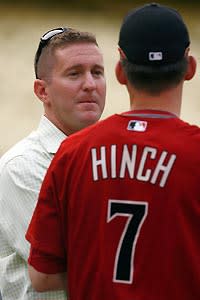Two words haunt Byrnes, dysfuntional D'backs
If Josh Byrnes will regret anything from his five years as Arizona Diamondbacks general manager, it won’t be the disastrous Eric Byrnes(notes) contract for which he took unfair blame. Nor will it be the risky trades necessitated by an ownership group that handicapped him with payroll restrictions year after year.
Two words. That’s what will stick with Byrnes as he wades back into the job pool following the Diamondbacks’ wildly short-sighted decision to fire him Thursday night as the team lingers in last place in the National League West for the second straight season. Two words he never should’ve uttered because even if they were true, they sounded bad, and the Diamondbacks owners seem intent on running their franchise to appease a fan base that couldn’t sell out a playoff game three years ago.
When Byrnes introduced new manager A.J. Hinch last May, he touted, among other things, Hinch’s understanding of “organizational advocacy.” It was Byrnes’ version of “Brownie, you’re doing a heck of a job.” However sound the concept – that team management shouldn’t be multi-level but run consistently from GM to manager – the phraseology was coarse and buttoned up. Hinch never had managed a team at any level, and if the best quality he brought was organizational advocacy, Byrnes was taking a monumental risk.
Hinch was fired, too, and Byrnes’ refusal to do so reportedly cost him his job. While executive Jerry DiPoto takes over as interim GM and Kirk Gibson inherits Hinch’s office, the Diamondbacks unleashed a wholesale purge of the group that brought them to the cusp of the World Series three years ago.
The team Byrnes inherited in 2005 was larded with talent from draft after great Mike Rizzo draft. The Diamondbacks’ 40-man roster was too loaded to include an infielder named Dan Uggla(notes), a palm-to-the-forehead move Byrnes would rue. And yet what he did with that talent – shepherd it through the minor leagues, flip it for top-end players and lock it down to what seemed like club-friendly contracts – led to the Diamondbacks rewarding him with an eight-year contract extension and partial ownership of the team in February 2008.
Such job security for a general manager was unparalleled and excessive, and it only reinforces the notion that whatever the Diamondbacks do, it’s almost always big and equally boneheaded. Byrnes cringed at then-CEO Jeff Moorad personally negotiating Eric Byrnes’ three-year, $30 million extension, for which the team received 445 at-bats of embarrassing baseball. Middling management always nudged aside Josh Byrnes’ best intentions.
And he wasn’t impervious to mistakes. Byrnes paid Chris Snyder(notes) like a starting catcher when he’s best suited to play part-time. He guaranteed $28 million for Chris Young after one good season, a deal that looked brutal until his resurgence this year. He traded Brett Anderson(notes), Carlos Gonzalez(notes) and Chris Carter as part of a six-player package for Dan Haren(notes), who seemed like the missing piece to push the Diamondbacks into contention for years.
When they started 2008 by winning 20 of 26, the Diamondbacks looked and acted the part. They finished the season 82-80, started off miserably in 2009 and Byrnes fired the respected Bob Melvin to install Hinch, who came down from a front-office job to the field.
It never took. Players were skeptical of Hinch’s qualifications, even if he had caught in the major leagues for parts of seven seasons. One Diamondbacks veteran, shortly after the hiring, wondered if A.J. stood for “A Joke.”
Byrnes put Hinch, a very capable baseball man, in a near-impossible position. To earn that respect and quiet the chatter about his qualifications and job status, Hinch needed to win. And the roster Byrnes handed him wasn’t equipped to do so.
Young wasn’t the only one who had disappointed. Stephen Drew(notes) was a serial underachiever. Max Scherzer(notes) couldn’t command his great stuff and was later traded.
The Diamondbacks were in rough shape, no question, and until an excellent 2009 draft, Byrnes had a run of three bad ones. The cleanup job for the next general manager isn’t exactly Deepwater Horizon, though. Justin Upton(notes) is a star-in-waiting and Mark Reynolds(notes) capable of the same. Haren is either a monster trade chip or ace. Edwin Jackson(notes), arm permitting after his 149-pitch no-hitter, has frontline potential. Miguel Montero(notes) is the franchise catcher Snyder never could be.
Arizona seems capable of so much more, and it’s worth wondering whether Byrnes would still be employed today had Brandon Webb’s(notes) arm not fallen apart at the beginning of last season. He had won one Cy Young and finished second in the two previous years. To lose a pitcher of that caliber and expect the team to remain the same isn’t just unfair. It’s negligent.
So goes life with Arizona ownership. Congratulations to Ken Kendrick and the rest of his partners, who get to write a biweekly check to Byrnes for the next 5 ½ years, plus buy him out of his ownership stake. Hinch has another 2 ½ years on his deal. Whether that monetary crunch impedes the Diamondbacks from spending to hire a proper GM going forward is the first of many questions Kendrick must answer.
Chief among them, though, is just how much Kendrick listens to the people who demonized those two words and why he bothers. A Wikipedia graffiti artist tagged Byrnes’ page by changing his name to Josh “Organizational Advocacy” Byrnes, and the sentiment was widespread. Yet Kendrick poached him from Boston to do in Phoenix what Theo Epstein had with the Red Sox, and to kneecap him now, all because the team wanted a manager fired? Well, there are two words for that, ones with which the Diamondbacks are quite familiar.
Organizational stupidity.


